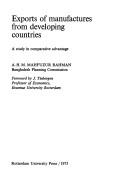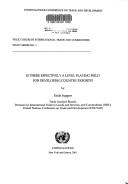| Listing 1 - 10 of 12 | << page >> |
Sort by
|

ISBN: 9780520249585 9780520249592 0520249585 0520249593 Year: 2007 Publisher: Berkeley: University of California press,
Abstract | Keywords | Export | Availability | Bookmark
 Loading...
Loading...Choose an application
- Reference Manager
- EndNote
- RefWorks (Direct export to RefWorks)
Fair trade has emerged as a fast-growing alternative market intended to bring better prices and greater social justice to small farmers around the world. But is it working? This vivid and detailed study of coffee farmers in Mexico offers the first thorough investigation of the social, economic, and environmental benefits of fair trade. Based on extensive research in Zapotec indigenous communities in the state of Oaxaca, 'Brewing Justice' follows the members of the cooperative Michiza, whose organic coffee is sold on the international fair trade market. It compares these families to conventional farming families in the same region, who depend on local middlemen and are vulnerable to the fluctuations of the world coffee market. Written in a clear and accessible style, the book carries readers into the lives of these coffee producer households and their communities, offering a nuanced analysis of the effects of fair trade on everyday life. 'Brewing Justice 'also paints a clear picture of the complex dynamics of the fair trade market and its relationship to larger global markets. Drawing on interviews with dozens of fair trade leaders, the book explores the changing politics of the international fair trade movement and provides recommendations for strengthening fair trade.
Foreign trade. International trade --- Third World: economic development problems --- Developing countries --- Coffee industry --- Exports --- Competition, Unfair. --- Coffee --- Café --- Exportations --- Concurrence déloyale --- Prices --- Commerce --- Prix --- Competition, Unfair --- Café --- Concurrence déloyale --- Developing countries: economic development problems --- Coffee industry - Developing countries --- Exports - Developing countries --- Coffee - Prices - Developing countries
Book
ISBN: 9211125170 9789211125177 Year: 2001 Volume: 8 Publisher: New York: United Nations,
Abstract | Keywords | Export | Availability | Bookmark
 Loading...
Loading...Choose an application
- Reference Manager
- EndNote
- RefWorks (Direct export to RefWorks)
Service industries --- Exports --- 339 --- -Service industries --- -339 --- Industries --- International trade --- Handel. Internationale economische betrekkingen. Wereldeconomie --binnenlandse als buitenlandse handel; zie ook {339.3} en {339.5} --- 339 Handel. Internationale economische betrekkingen. Wereldeconomie --binnenlandse als buitenlandse handel; zie ook {339.3} en {339.5} --- Service industries - Developing countries --- Exports - Developing countries
Book
ISBN: 0521069599 9780521069595 Year: 1971 Volume: 25 Publisher: Cambridge: Cambridge university press,
Abstract | Keywords | Export | Availability | Bookmark
 Loading...
Loading...Choose an application
- Reference Manager
- EndNote
- RefWorks (Direct export to RefWorks)
Sterling area --- Exports --- -Sterling area --- 330.35 --- 330.35 Economische groei. Kwantitatieve toename. Technische vooruitgang --zie ook {338.09} --- Economische groei. Kwantitatieve toename. Technische vooruitgang --zie ook {338.09} --- Developing countries --- Sterling area. --- Commerce. --- Third World: economic development problems --- Developing countries: economic development problems --- Exports - Developing countries
Book
ISBN: 0520282248 1322058784 0520957881 9780520957886 9781322058788 9780520282247 Year: 2014 Publisher: Oakland, California
Abstract | Keywords | Export | Availability | Bookmark
 Loading...
Loading...Choose an application
- Reference Manager
- EndNote
- RefWorks (Direct export to RefWorks)
Fair trade is a fast-growing alternative market intended to bring better prices and greater social justice to small farmers around the world. But what does a fair-trade label signify? This vivid study of coffee farmers in Mexico offers the first thorough investigation of the social, economic, and environmental benefits of fair trade. Based on extensive research in Zapotec indigenous communities in Oaxaca, Brewing Justice follows the members of the cooperative Michiza, whose organic coffee is sold on the international fair-trade market, and compares them to conventional farming families in the same region. The book carries readers into the lives of coffee-producer households and communities, offering a nuanced analysis of fair trade's effects on everyday life and the limits of its impact. Brewing Justice paints a clear picture of the dynamics of the fair-trade market and its relationship to the global economy. Drawing on interviews with dozens of fair-trade leaders, the book also explores the movement's fraught politics, especially the challenges posed by rapid growth and the increased role of transnational corporations. It concludes with recommendations to strengthen and protect the integrity of fair trade. This updated edition includes a substantial new chapter that assesses recent developments in both coffee-growing communities and movement politics, offering a guide to navigating the shifting landscape of fair-trade consumption.
Coffee -- Prices -- Developing countries. --- Coffee industry -- Developing countries. --- Exports -- Developing countries. --- Coffee industry --- Exports --- Competition, Unfair --- Coffee --- Business & Economics --- Industries --- Prices --- Competition, Unfair. --- Coffea --- Coffea arabica --- Competition --- Competition law --- Fair trade --- Unfair competition --- Unfair trade practices --- Coffee trade --- Law and legislation --- Psychotropic plants --- Rubiaceae --- Seed crops --- Commercial crimes --- Commercial law --- Industrial property --- Torts --- Advertising laws --- Beverage industry --- E-books --- Coffee industry -- Developing countries.. --- Exports -- Developing countries.. --- Competition, Unfair.. --- alternative marketing. --- anthropology. --- business and industry. --- business. --- capitalism. --- coffee farmers. --- coffee industry. --- coffee lovers. --- coffee producing households. --- coffee. --- corporations. --- economics. --- fair trade coffee. --- fair trade consumption. --- fair trade. --- global economy. --- international business. --- international fair trade market. --- justice. --- mexican coffee. --- mexico. --- michiza. --- money and power. --- oaxaca. --- organic coffee. --- political economy. --- politics. --- small farmers. --- social justice. --- transnational corporations. --- zapotec indigenous communities.

ISBN: 9023728041 9789023728047 Year: 1973 Volume: 4 Publisher: Rotterdam: Universitaire Pers Rotterdam,
Abstract | Keywords | Export | Availability | Bookmark
 Loading...
Loading...Choose an application
- Reference Manager
- EndNote
- RefWorks (Direct export to RefWorks)
Foreign trade. International trade --- Developing countries --- Manufacturing industries --- Industries --- Exports --- Commerce --- 339.54 <1-772> --- -Industries --- -Manufacturing industries --- -Developing Countries --- Manufactures --- Industrial production --- Industry --- Economics --- International trade --- Buitenlandse economische politiek. Buitenlandse handelspolitiek. Instrumentarium van de buitenlandse handel--Onontwikkelde, onderontwikkelde gebieden --- Commerce. --- 339.54 <1-772> Buitenlandse economische politiek. Buitenlandse handelspolitiek. Instrumentarium van de buitenlandse handel--Onontwikkelde, onderontwikkelde gebieden --- Manufacturing industries - Developing countries --- Industries - Developing countries --- Exports - Developing countries --- Developing countries - Commerce
Book
ISBN: 9051701136 Year: 1991 Volume: vol *2 Publisher: Amsterdam Thesis/Tinbergen Institute
Abstract | Keywords | Export | Availability | Bookmark
 Loading...
Loading...Choose an application
- Reference Manager
- EndNote
- RefWorks (Direct export to RefWorks)
Foreign trade. International trade --- Developing countries --- 339.54 <1-773> --- Exports --- -Manufacturing industries --- -820 Internationale Betrekkingen --- 825 Ontwikkelingssamenwerking --- 830 Economie --- 831.1 Handelspolitiek --- Industries --- Manufactures --- International trade --- Buitenlandse economische politiek. Buitenlandse handelspolitiek. Instrumentarium van de buitenlandse handel--Gebieden in ontwikkeling. Ontwikkelingslanden --- Econometric models --- Automation --- 339.54 <1-773> Buitenlandse economische politiek. Buitenlandse handelspolitiek. Instrumentarium van de buitenlandse handel--Gebieden in ontwikkeling. Ontwikkelingslanden --- Manufacturing industries --- 820 Internationale Betrekkingen --- Export --- Exports - Developing countries - Econometric models. --- Developing countries - Manufactures - Econometric models.
Book
ISBN: 928261624X 9789282616246 Year: 1990 Publisher: Luxembourg: Office for official publications of the European Communities,
Abstract | Keywords | Export | Availability | Bookmark
 Loading...
Loading...Choose an application
- Reference Manager
- EndNote
- RefWorks (Direct export to RefWorks)
Foreign trade. International trade --- European Union --- Developing countries --- Imports --- Commercial products --- Exports --- Statistics. --- -Commercial products --- -Exports --- -339.16 --- 339.5 --- <4> --- <1-773> --- International trade --- Commodities --- Economic goods --- Merchandise --- Products, Commercial --- Commodity exchanges --- Manufactures --- Substitute products --- Statistics --- Classification --- Soorten en vormen van handel naar diverse kriteria. Termijnhandel. Ruilhandel. Grondstoffenhandel. Clearinghandel. Rekeninghandel --- Buitenlandse handel. Internationale handel. Ruilvoet --- Europa --- Gebieden in ontwikkeling. Ontwikkelingslanden --- Contracting out --- <1-773> Gebieden in ontwikkeling. Ontwikkelingslanden --- <4> Europa --- 339.5 Buitenlandse handel. Internationale handel. Ruilvoet --- 339.16 Soorten en vormen van handel naar diverse kriteria. Termijnhandel. Ruilhandel. Grondstoffenhandel. Clearinghandel. Rekeninghandel --- 339.16 --- Imports - European Economic Community countries - Statistics. --- Commercial products - Classification. --- Exports - Developing countries - Statistics.
Book
ISBN: 1451862709 1462368999 1451908067 9786613823649 1452750157 128344979X Year: 2006 Publisher: Washington, D.C. : International Monetary Fund,
Abstract | Keywords | Export | Availability | Bookmark
 Loading...
Loading...Choose an application
- Reference Manager
- EndNote
- RefWorks (Direct export to RefWorks)
This paper assesses the effects of reducing tariffs under the Doha Round on market access for developing countries. It shows that for many developing countries, actual preferential access is less generous than it appears because of low product coverage or complex rules of origin. Thus lowering tariffs under the multilateral system is likely to lead to a net increase in market access for many developing countries, with gains in market access offsetting losses from preference erosion. Furthermore, comparing various tariff-cutting proposals, the research shows that the largest gains in market access are generated by higher tariff cuts in agriculture.
Electronic books. -- local. --- Exports -- Developing countries -- Econometric models. --- Tariff preferences -- Developing countries -- Econometric models. --- Tariff preferences --- Exports --- Econometric models. --- Differential duty --- Discriminating duty --- Generalized system of preferences (Tariff) --- GSP (Tariff) --- Preferences, Tariff --- Preferential duty --- Preferential tariff --- Trade preferences --- International trade --- Tariff --- Exports and Imports --- Taxation --- Economic Theory --- Trade Policy --- International Trade Organizations --- Empirical Studies of Trade --- Economic Integration --- Trade: General --- Neoclassical Models of Trade --- Agriculture: Aggregate Supply and Demand Analysis --- Prices --- Public finance & taxation --- International economics --- Economic theory & philosophy --- Tariffs --- Comparative advantage --- Demand elasticity --- Imports --- Taxes --- Economic theory --- Elasticity --- Economics --- United States
Book
ISBN: 1461412951 9786613353825 1283353822 146141296X Year: 2012 Publisher: New York : Springer,
Abstract | Keywords | Export | Availability | Bookmark
 Loading...
Loading...Choose an application
- Reference Manager
- EndNote
- RefWorks (Direct export to RefWorks)
“Born global” (BG) firms have attracted many researchers throughout the last decade. The emergence of this phenomenon initially posed a serious challenge to the validity and applicability of the traditional “stage” theory of internationalization; however, scholars have more recently been able to reconcile traditional and new theories into a single framework for studying the process of internationalization. This volume applies both network theory and knowledge-based theory to analyze export assistance in the context of internationalization of low-tech BG firms in developing countries (with an in-depth study of the apparel industry in Bangladesh). The findings that non-governmental network partners provide more useful advice than government agencies is one that may resonate through other countries, including developed economies. Government’s more useful role is confined to the financial support and incentives that are provided to such firms. It is, however, the commitment to exporting that emerges as critical for performance, more so than export strategy, suggesting that enhanced export performance is to attract, reassure and motivate entrepreneurs in ways that strengthen their commitment to international expansion. .
Export subsidies -- Developing countries. --- Exports -- Developing countries. --- Foreign trade promotion -- Developing countries. --- Foreign trade promotion --- Development economics --- Economic policy --- International economic relations --- Exports --- Management science --- Commerce --- Business & Economics --- International Commerce --- Exports. --- Management science. --- Quantitative business analysis --- International economics. --- Economic policy. --- Development economics. --- Economics. --- International Economics. --- Economic Policy. --- Development Economics. --- Management --- Problem solving --- Operations research --- Statistical decision --- International trade --- Economics --- Economic development --- Economic nationalism --- Economic planning --- National planning --- State planning --- Planning --- National security --- Social policy --- Economic policy, Foreign --- Economic relations, Foreign --- Economics, International --- Foreign economic policy --- Foreign economic relations --- Interdependence of nations --- International economic policy --- International economics --- New international economic order --- International relations --- Economic sanctions

ISBN: 9211124921 9789211124927 Year: 2001 Volume: no. 1 Publisher: New York: United Nations,
Abstract | Keywords | Export | Availability | Bookmark
 Loading...
Loading...Choose an application
- Reference Manager
- EndNote
- RefWorks (Direct export to RefWorks)
339 --- Exports --- -Non-tariff trade barriers --- Non-tariff distortions of trade --- Nontariff trade barriers --- Protectionism --- Tariff --- International trade --- 339 Handel. Internationale economische betrekkingen. Wereldeconomie --binnenlandse als buitenlandse handel zie ook {339.3} en {339.5} --- Handel. Internationale economische betrekkingen. Wereldeconomie --binnenlandse als buitenlandse handel zie ook {339.3} en {339.5} --- Non-tariff trade barriers --- 339 Handel. Internationale economische betrekkingen. Wereldeconomie --binnenlandse als buitenlandse handel; zie ook {339.3} en {339.5} --- Handel. Internationale economische betrekkingen. Wereldeconomie --binnenlandse als buitenlandse handel; zie ook {339.3} en {339.5} --- Exports - Developing countries
| Listing 1 - 10 of 12 | << page >> |
Sort by
|

 Search
Search Feedback
Feedback About UniCat
About UniCat  Help
Help News
News